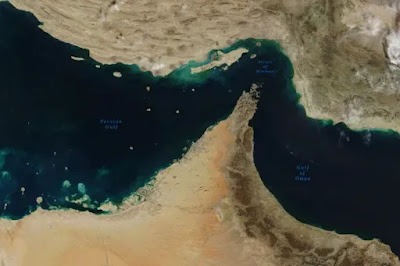Israel's attack on military and nuclear targets in Iran is rekindling the most worrying fear of global energy markets: the possibility that Tehran will respond with its "nuclear" option – the closure of the Strait of Hormuz.
It is one of the most critical oil channels on the planet, passing through almost a third of the world's offshore oil exports, about 20 million barrels of oil per day.
Although the likelihood of a complete blockade is considered low by most experts, the geopolitical tension has already been dramatically reflected in prices: Brent crude momentarily jumped even above $78/barrel — the biggest intra-session rise since Russia's invasion of Ukraine.
A rare threat, a common nightmare
Iran has threatened in the past to close the Strait — most recently in 2018, against the backdrop of the U.S. withdrawal from the nuclear deal. Similar rhetoric had preceded it in 2011-2012. But it never materialized this threat.
Because; Because, as analyst Anas Alhajji explains to CNBC, "Iran's friends will suffer. And perhaps more so than his enemies."
China, the largest customer of Iranian oil, imports about 75 percent of its exports. A disruption in this corridor will hurt not only the West, but also Tehran itself.
Ellen Wald, co-founder of Washington Ivy Advisors, is even clearer: "There is not only a gain for Iran in closing the Straits, but also damage. Because Iran's own trade flows depend on them." At the same time, he emphasizes that the existence of alternative channels from the UAE and Oman makes a complete blockade practically impossible.
These remarks, however, are based on the assumption that Tehran and its supreme leader Ali Khamenei will act... Rationally. The same case led many analysts to conclude that Netanyahu would never attempt a strike on Iranian nuclear facilities without direct U.S. support.
In addition, there is a real risk, as RBC Capital Markets' Helima Croft points out, which is none other than selective attacks on oil tankers, interference with navigation and the laying of mines. In such scenarios, the markets react with intense nervousness and intense risk premium.
Already, leading freight brokers and companies like Frontline are becoming more hesitant about routing ships in the Persian Gulf. As Frontline CEO Lars Barstad told Bloomberg, the company is taking an "extremely cautious stance" after the Israeli attacks.
A shock to the markets, with the aroma of 2019
Another scenario that is playing out loud is that Iran will attempt to strike oil facilities in the region, thus lighting fires in the energy market without even closing the Strait of Hormuz. The memory of the 2019 attack on Aramco's facilities, implicitly credited to Iran, is coming back.
If there is a similar blow to Saudi Arabia's or Iraqi's infrastructure, prices could skyrocket out of control.
JPMorgan Chase estimates that in the event of a blockade of Hormuz flows or a generalized conflagration in the Middle East, oil could reach $130 a barrel.
Trump and Saudi Arabia
U.S. President Donald Trump says on Truth Social that "Iran has one last chance for a deal," threatening "even harder strikes." At the same time, it is not excluded that it will turn to the Strategic Petroleum Reserves (SPR), which are at historically low levels — about 400 million barrels, from 727 million barrels at full capacity. However, he has criticized the "bleeding" of the stock under Biden.
Saudi Arabia condemned the Israeli attack, but may come under intense pressure from Washington to activate additional production capacity to curb rising prices. OPEC+, to which Iran belongs, retains excess supply, but most of it is in Gulf states – close to the line of fire.
China, on the other hand, may play a restraining role: as Iran's main trading partner, it has a strategic interest in keeping the Strait corridor open and not inflating energy prices further.
The only certainty is that, as the Israeli-Iranian conflict threatens to widen, the 50-kilometer narrow passage between the Persian Gulf and the Sea of Oman is turning into a geopolitical razor's edge.
